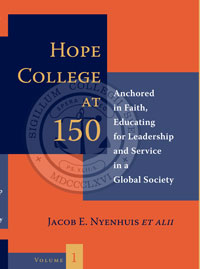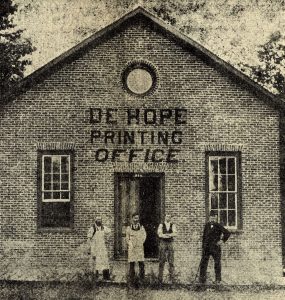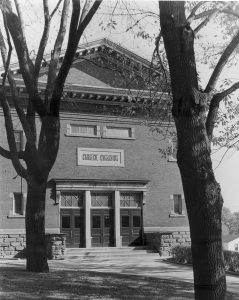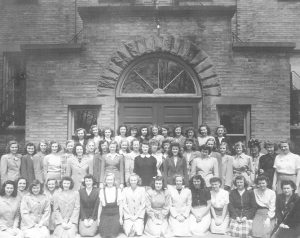150 Years in the Making
The landmark anniversary history tome Hope College at 150 has so large a story to tell that it fills not one volume but two.
Subtitled “Anchored in Faith, Educating for Leadership and Service in a Global Society,” the 1,410-page magnum opus has been published in paired hardcovers by the college’s Van Raalte Press as part of the Historical Series of the Reformed Church in America. The editor and primary author is Dr. Jacob E. Nyenhuis, who is provost emeritus and professor of classics emeritus, and director of the A.C. Van Raalte Institute, with multiple chapters written by current and former faculty and staff as well as alumni, all with long associations with Hope.
Hope College at 150: Anchored in Faith, Educating for Leadership and Service in a Global Society is the first comprehensive history of the college, which was chartered in 1866, since A Century of Hope was published in 1968. A Century of Hope followed the college’s 1966 centennial celebration, and Hope College at 150 follows Hope’s 2016 sesquicentennial year.
Hope College at 150 carries the college’s story from its chartering through the sesquicentennial, but some of the chronicle extends well beyond 2016. To provide an accessible narrative as well as a lasting resource for researchers, the volumes are organized into nine thematic chapters complemented by 12 detailed appendices, and illustrated with hundreds of photographs, most in color.
“What I set out to do was tell the fascinating story of Hope College from its conception to the present day, and to record for posterity a great deal of information that would prove useful,” said Nyenhuis, who has been at the college for 44 years, noting that planning for the book began more than a decade ago. “I tried to put in, as much as possible, not only a record of what has happened but also some key historical documents and the record of how things have changed.”
“The trajectory of Hope College is not a continuous upward path — there are zigs and zags along the way,” he said. “But the contrast between the simple beginnings and where we are in the second decade of the 21st century is tremendous.”
Hope traces its origins to the Pioneer School, a Christian secondary school founded in 1851 by the Rev. Albertus C. Van Raalte as the Holland community’s first educational institution. In 1855, the Pioneer School evolved into the Holland Academy, which in 1862 enrolled its first college class. Hope was chartered by the State of Michigan on May 14, 1866, the date that the college uses for anchoring its anniversaries.
The college’s Class of 1866 had eight graduates. This year’s graduating Class of 2019 had 713. Featured in Colleges That Change Lives: 40 Schools That Will Change the Way You Think About Colleges, Hope has received national acclaim on multiple measures through the years and is nationally respected as a pioneer and leader in providing an outstanding education by engaging undergraduate students in inquiry-based learning through collaborative research with faculty mentors.
The thematic chapters cover the academic program, architecture, finances, sports, student life, diversity and inclusion, the alumni association, and the relationship between the college and the Reformed Church in America. The appendices include a listing of all the faculty (and their progress through the academic ranks), profiles of presidents and senior leaders, a history of all the student organizations, 150 years of enrollment and financial data, lists of endowed professorships, notable alumni, honorary degree and other award recipients, college songs and strategic plans. The name index includes some 6,000 names, and the subject index runs to 60 pages.
In addition to Nyenhuis, the authors are: Dr. Michael J. Douma ’04, Alfredo M. Gonzales ’76, Dr. John E. Jobson ’95, Dr. James C. Kennedy, Thomas L. Renner ’67, Dr. Robert P. Swierenga, Scott Travis ’06, and the Rev. Dr. Dennis N. Voskuil. Additional research was conducted by Dr. Elton J. Bruins ’50 and Mackenzie Schumborg ’16. The editorial associate and copy editor was JoHannah Karachy ’83 Smith, custom-created maps were by Mark Cook ’73, layout and design were by Russell L. Gasero ’73, and the cover design was by Willem Mineur. (More is available online about the authors and production team.)

Hope College at 150: Anchored in Faith, Educating for Leadership and Service in a Global Society costs $100, and is available through the Hope College Bookstore, which can be visited online at bookstore.hope.edu or called at 616-395-7833.



